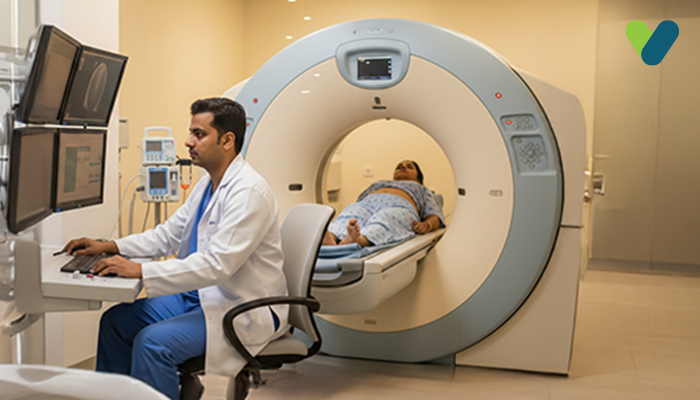Polycystic ovarian disorder (PCOD) is a common hormonal condition among women, and an accurate diagnosis can be made through the advanced PCOD profile test. Keep reading to find out more about PCOD and the advanced PCOD test in detail.
What is a polycystic ovarian disease (PCOD)?
PCOD, also known as Stein-Leventhal syndrome, is a common disease in reproductive-age women that is characterised by sex hormone imbalances. Hyperinsulinemia (a condition where the amount of insulin is more than the normal range) and insulin resistance (resistance to insulin hormone, causing high blood sugar) play important roles in the disordered physiological manifestation of this disease. Women suffering from PCOD develop ovarian cysts and produce an excess of androgens or the male sex hormones (hyperandrogenism). This can lead to issues like infertility, amenorrhea (no period), hirsutism (abnormal hair growth), and irregular periods. PCOD is a chronic disorder that can result in serious issues such as ovarian or endometrial cancer, diabetes, and coronary artery disease later in life. As a result, diagnosing PCOD at an early stage is critical to recognise and delay or stop its effects.PCOD signs and symptoms
Even though the exact cause of PCOD is unknown, but there does some to be some evidence of the condition being genetic. PCOD symptoms are typically mild at first. Among the symptoms of the polycystic ovarian disease are:- Acne
- Irregular periods
- Weight gain
- Difficulty getting pregnant, and infertility
- Severe menstrual bleeding
- Excessive hair growth on the face and neck
- Headache
- Thinning hair
- Skin darkening
- Depression and other mental health issues
What is the advanced polycystic ovarian disease (PCOD) test?
An advanced polycystic ovarian disorder (PCOD) profile blood test is a cluster of tests that evaluate the functions and levels of hormones in your body. The results of the test can help diagnose PCOD, monitor treatment progress, and assess the risk of related health problems. LivLong has affiliations with best labs for the PCOS testing. The PCOD test package typically includes the evaluation of the following hormones:- Follicle-stimulating hormone (FSH)
- Luteinizing hormone (LH)
- Oestrogen
- Testosterone
- Prolactin
- Insulin test
- Glucose test

